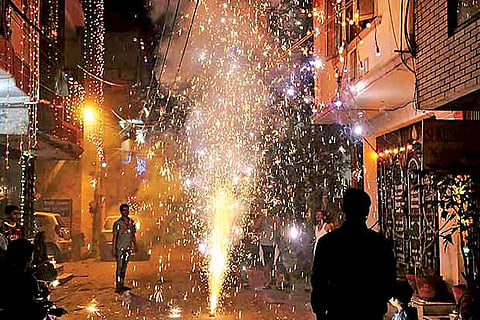

Chennai
For the umpteenth year in a row, citizens in Tamil Nadu and the rest of India laid waste to the government’s best-laid plans of curbing air, noise, and land pollution during the festival of lights by embarking on what could be described as a vengeful display of pyrotechnics that extended well beyond the prescribed hours. Last Friday, the Tamil Nadu Pollution Control Board released data that confirmed that air pollution levels had increased significantly during this Deepavali. The Air Quality Index (AQI) was poor in all monitoring stations in Chennai. The concentration of Particulate Matter (PM10) hovered between 187 to 283 microgram/m3 in areas such as T Nagar, Sowcarpet, Besant Nagar, Triplicane, and Nungambakkam. This is a considerable jump in air quality deterioration compared to last year when the Central and State governments had enforced blanket bans on any kind of fireworks being used during the festive season. In 2020, the PM10 concentration during the same period averaged between 52 and 111 microgram/m3.
A similar trend was witnessed in the metrics pertaining to PM2.5, which ranged between 175-257 microgram/m3, against the permissible limit of 60 microgram/m3. Coupled with the high relative humidity of 90%, low wind speed and incessant bursting of firecrackers, the air quality of the city took a considerable hit on Deepavali, and visibility was also severely affected in regions like Velachery and Taramani. This, of course, brings us to the question of enforcing time limits for bursting crackers, a concept that has become a running joke among Chennaiites for many years now. While the Court had designated one hour each in the morning and night for bursting crackers on Deepavali, neighbourhoods in the city painted an entirely different picture. The bursting of loud fireworks, not just in by-lanes but even on main roads was a day-long affair since last Thursday. The Chennai Police had booked as many as 758 people for violation of time restrictions, but the number could have been far higher if the crackdown was enforced in letter and spirit.
The revelries of the evening entailed arduous hours for conservancy workers, the morning after. The Greater Chennai Corporation collected the highest quantum of cracker waste last Thursday and Friday as compared to the previous five years, a staggering 138 tonnes. The GCC had comparatively disposed of 95, 103, and 98 tonnes of firecracker waste in 2018, 2019, and 2020, respectively, an indication that Chennaiites are bursting more crackers than the previous years.
Deepavali is also one of those times in a year when citizens across India get a free pass to litter the roads with firecracker waste, and not be questioned about cleaning it up afterwards. A silver lining was the fact that Deepavali passed off as a relatively incident-free festival in Chennai barring a few minor burn-related injuries of a non-lethal nature. Chennaiites were better off as compared to people in Delhi who complained of watery eyes and itchy throats in the aftermath of the festival.
To understand our privilege when it comes to festive occasions, one just needs to look at our south-east Asian neighbours that deal with the issue of fireworks in a very different manner. In Singapore, the purchase and sale of fireworks are banned for ordinary citizens. Similarly, in Thailand, a special permit must be sought from government authorities for setting off fireworks, and that too under restricted conditions such as away from residential areas, government buildings, fuel storage stations, hospitals, courts, etc. Expecting people to curb their enthusiasm during a festive season is an extreme step when one factors in the centuries of tradition and sentiment behind the celebrations. The least we could do is to make it a habit to enjoy our festivals responsibly, and not to overdo it to an extent where the government is compelled to step in and take matters into its own hands.
Visit news.dtnext.in to explore our interactive epaper!
Download the DT Next app for more exciting features!
Click here for iOS
Click here for Android